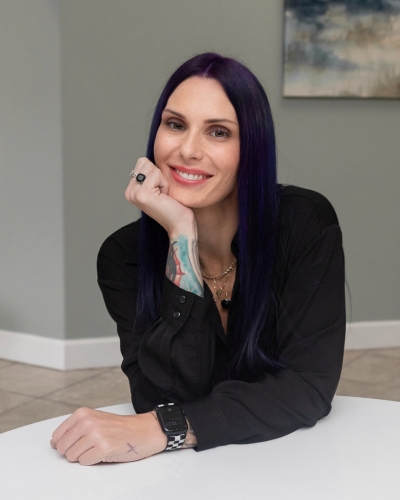Obsessive-Compulsive Disorder

Also known as OCD, obsessive-compulsive disorder impacts approximately 2-3% of people in America. Women have a slightly higher prevalence of OCD compared to men. The severity of OCD can vary greatly from mild cases that are easily mistaken for “odd” behavior to severe cases that make it difficult for individuals to function on a day-to-day basis. Unmanaged and/or severe OCD can lead to additional mental health struggles, but the reality is that the vast majority of cases are manageable with professional guidance.
%
adults in the U.S. have an anxiety disorder
%
of adults with OCD had serious impairment in the past year, based on the Sheehan Disability Scale
What is OCD?
Obsessive-Compulsive Disorder is a condition identified by 2 characteristics:
- Obsessive thoughts
- Compulsive behaviors
It is the persistent obsessive thoughts that warrant repetitive, compulsive behaviors in order to address the obsessive thoughts. Common examples of repetitive behaviors include hand washing/cleaning, checking on things (like flipping light switches multiple times), mental acts (like counting), or other activities (such as tapping). If a person does not perform the action or behavior, then the obsessive thoughts can become paralyzing, distracting, or even overwhelming.
Causes & Risk Factors for OCD
While the exact cause of OCD is not known, there are a few things we know about the onset of this disorder. For instance, the onset of OCD most commonly happens between age 8-12 or the late teens to early 20’s. There is also believed to be a genetic factor as there is a higher prevalence among those with a family history of OCD. It is also considered to be a brain disorder, which the International OCD Foundation explains as “problems in communication between the front part of the brain and deeper structures of the brain“. There are also case of certain childhood infections that can lead to OCD.
Symptoms
OCD symptoms are best broken down into two categories based on the components of OCD:
Obsessions
Fear of germs/contamination or forgetting, losing, or misplacing something
Concerns about losing control over one’s behavior
Aggressive thoughts toward others or oneself
Unwanted, forbidden, or taboo thoughts involving sex, religion, or harm
Needing to have things symmetrical or in perfect order
Compulsions
Excessive cleaning or handwashing
Need for items to be arranged in a specific manner
Repeatedly checking things, (ie: doors are locked, oven is off)
Compulsive counting
Repeating specific words silently (sometimes praying)
Other symptoms can include anxiety (from the obsessive thought) and temporary relief (from completing the compulsive behavior).
Treatment
While there is no quick fix for OCD, it is certainly treatable. Working with a professional who is experienced in treating OCD can make a significant difference in the quality of care and progress. The most common treatment approaches include:
CBT
In combination with a form of exposure therapy, cognitive-behavioral therapy helps people with OCD to face their fears and learn that their obsessive thoughts do not need to be “put right” and that everything will be okay even if they don’t follow through with their rituals/compulsions.
Medication
In some cases, medication can be helpful in managing anxiety and other symptoms of OCD. You may want to discuss this option with your care provider and if it might ultimately be a powerful tool in helping you overcome your OCD.
Living with OCD
While Obsessive-Compulsive Disorder is treatable, some people do have to learn how to manage the symptoms and live with the condition – at least while working through treatment. Even working with a therapist or spending time in a more controlled setting – such as a residential treatment facility – can help with learning tools and techniques to use on a daily basis.
Overcoming OCD at Onyx
It is a journey overcoming OCD, but our team at Onyx Behavioral Health is here to guide you along the way. Contact us today at 888-242-5716 to learn more about our behavioral health treatment residence and how it may help you live a better, more fulfilling life.
Discover Healing with Onyx Behavioral Health
Additional Resources
Daily OCD Hacks & Strategies for Reducing Anxiety
Obsessive Compulsive Disorder (OCD) is a mental health condition characterized by intrusive thoughts and compulsive behaviors that can significantly disrupt daily life. For many, these obsessive patterns lead to heightened anxiety, disrupting daily work life,...
How Do You Know if You Have OCD
Obsessive-compulsive disorder (OCD) is a prevalent mental health condition, often enveloped in misconceptions and stereotypes. At its core, OCD is more than just being overly neat or afraid of germs; it's a complex disorder that significantly impacts the lives of...
10 Examples of OCD Behaviors
Obsessive-Compulsive Disorder (OCD) is a complex mental health condition defined by unwanted thoughts and fears (obsessions) that compel repetitive behaviors (compulsions). These compulsions are efforts to alleviate the anxiety these thoughts provoke, leading to a...




 Michaela Welk, LMHC
Michaela Welk, LMHC Bunny Berman
Bunny Berman Tank
Tank Richard E. LoSardo, MD
Richard E. LoSardo, MD
 Christopher Payne
Christopher Payne Bernard Benjamin
Bernard Benjamin Tiffany Bellino
Tiffany Bellino